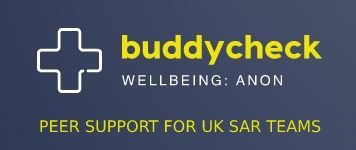I’m a strong advocate for wellbeing in voluntary Search and Rescue teams.
I wanted to create a site where SAR team members could get advice anonymously, but from their peers.
Recent research suggests that 80% of NHS and Emergency Services staff prefer to stay anonymous when talking about their own mental health, and this site aims to fill a small niche between SAR teams’ own internal wellbeing programmes, and the national anonymous counselling services from SHOUT and SAMARITANS.
As anonymous as you need it to be
Registering with Buddycheck requires a real email address (so you can get alerts to new messages arriving). But this is only visible to the site administrator, Andy.
The site admin has no way to see your private messages, or tie any message into an email address.
Your username can be as random as you like. It’s up to you to keep your identity as much of a secret as you wish. If you want to share your phone number with the Buddy you make on here so you can pick up in person, crack on… and good luck.
Not for profit, not for gain
There’s only one administrator for this site, which is me, Andy. I’m Chair of West Mercia Search and Rescue team, a MIND Blue Light Programme Champion, a Mental Health First Aider, and by day I work for the ambulance service on the front line.
This site costs very little to run, so it won’t have advertising, and your details will NEVER be sold, traded, shared or exploited. I’ll delete the entire site if it ever looks like it’s not viable, and someone else can start afresh.
In the event of my early demise, the site admin details are kept in a sealed envelope to be given to the Secretary of West Mercia SAR so they can find a new trusted sole administrator.
Isn’t this doing the job of SHOUT/Samaritans?
Buddycheck is meant to be a first-line of peer support for all SAR team members, with a facility to message people who may well have similar experiences, and who know the stresses and challenges of SAR.
It’s not a replacement for SHOUT/Samaritans, as they (and others) do amazing work. It’s merely another free, easily accessible tool for anyone who thinks it will do them good. My view is that the more routes to wellbeing on offer, the more we break down any stigma.
Buddycheck isn’t for managing a crisis
Mental Health First Aiders are trained to identify someone in crisis and signpost them to more professional help. That’s the point of Buddycheck.
If you recognise that you’re at a point of crisis, or building towards one, then peer-support is no substitute for professional help. Contact your GP, or self refer to NHS talking therapy. If you’re in immediate danger of harm, call 999 for an ambulance or get to A&E.
However, if what you need is a bit of perspective, a bit of a chat without burden, then give Buddycheck a go if you like.
Are Buddies vetted or monitored?
No. There are many motivations and qualifications for being an effective buddy. Mental Health First Aid, Mental Health Awareness, being a healthcare professional or just having life experience and a willingness to signpost others to better help. I don’t believe that Buddycheck should be overly governed (and certainly not by any sort of governing body), and don’t want to limit it to a certain qualification which excludes some of our peers.
Having said that, if you have concerns about the suitability of any Buddy, or want to report anything you feel innappropriate, drop me a PM to Andy.
